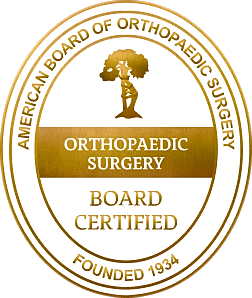
in New York & New Jersey

















When chronic neck or back pain starts interfering with your life, and conservative treatments aren’t working—surgery may come into the conversation. For patients who want relief without losing flexibility, our NYC and NJ disc replacement surgery offers a powerful alternative to spinal fusion.
Rather than fusing bones together, disc replacement removes the damaged disc and replaces it with a durable artificial disc that mimics natural movement. This helps relieve nerve pressure and pain while allowing the spine to bend, twist, and move as it should.
At the Institute of Comprehensive Spine Care, led by the esteemed spine surgeon, Gbolahan Okubadejo, MD, FAAOS, our dedicated team is committed to delivering exceptional care and personalized treatment options designed to meet your specific needs. We understand the debilitating effects of disc-related conditions and their impact on your daily life. Our primary goal is to provide you with long-lasting relief and restore your mobility through state-of-the-art disc replacement surgery.
Disc replacement surgery, also known as artificial disc replacement, is a surgical procedure that involves replacing a damaged or degenerated disc in the spine with an artificial one.
This surgery is primarily aimed at relieving pain and restoring normal motion in the spine. The artificial disc is designed to mimic the natural disc in terms of size and function, allowing for movement in the spine while providing stability. Disc replacement surgery can offer several benefits over traditional spinal fusion, such as preserving the range of motion and potentially reducing stress on adjacent discs.

Disc replacement may be recommended for patients with:
Herniated Discs: A herniated disc occurs when the soft inner core of the disc protrudes through its outer layer. If conservative treatments fail to alleviate symptoms such as severe pain, weakness, or numbness, disc replacement surgery may be considered to remove the damaged disc and replace it with an artificial implant.
Degenerative Disc Disease: Disc replacement surgery may be performed when degenerative disc disease leads to significant pain, reduced mobility, and impaired quality of life. This condition typically occurs due to the natural aging process, causing the intervertebral discs to lose their elasticity, height, and ability to cushion the spine properly.
Disc Degeneration with Spinal Instability: When severe disc degeneration leads to spinal instability, where there is excessive movement between the vertebrae, disc replacement surgery can help restore stability and alleviate associated symptoms. This instability may result from advanced disc degeneration, traumatic injuries, or previous surgeries.
Failed Back Surgery Syndrome: In cases where previous back surgeries have failed to provide relief or have resulted in recurrent pain, disc replacement surgery may be considered as an alternative. It can address the underlying cause of persistent pain or instability, offering the possibility of improved outcomes and reduced symptoms.
Determining whether you need disc replacement surgery begins with a comprehensive evaluation of your symptoms, medical history, and how those symptoms are affecting daily life.
During your consultation for disc replacement surgery NYC & NJ board-certified spine surgeon, Dr. Okubadejo, will carefully assess issues like persistent neck or back pain, numbness, tingling, or weakness that haven’t responded to conservative treatments such as physical therapy, medications, or spinal injections. A physical exam helps pinpoint signs of nerve compression or spinal instability, while a discussion about lifestyle and treatment goals ensures any surgical recommendation aligns with your needs.
Advanced imaging—typically MRI or CT scans—is then used to confirm the diagnosis and evaluate the condition of the spinal discs. Disc replacement may be considered if one or more discs are severely degenerated or herniated but the surrounding spinal structures, like the facet joints and bones, are still healthy.

Disc replacement is performed under general anesthesia. A small incision is made at the front of the neck (for cervical disc replacement) or abdomen (for lumbar), allowing access to the spine without cutting through muscle from the back.
The damaged disc is carefully removed, and the artificial disc is placed between the vertebrae. The implant is designed to match the size and function of a natural disc, supporting normal spinal movement. Once the new disc is in place, the incision is closed with sutures or surgical glue. The patient is carefully monitored before returning home, usually the same or next day.
When performed on the right candidate, disc replacement can offer many advantages, including:
By mimicking natural disc function, this procedure supports long-term spinal health while helping you move and feel better faster.

Ideal candidates for disc replacement surgery are typically individuals with single-level disc pathology, healthy spinal segments adjacent to the affected disc, and a reasonable degree of overall spinal stability.
However, each case is unique, and our experienced medical team will conduct a thorough evaluation to determine if disc replacement surgery is the most suitable treatment option for you. Patients with severe spinal instability, multiple disc pathologies, significant facet joint disease, or certain medical conditions may not be ideal candidates for disc replacement surgery. Our specialists will carefully consider your specific circumstances and recommend the most appropriate treatment plan based on your individual needs.
Recovery from disc replacement surgery is typically shorter than recovery from spinal fusion.
You’ll go home the same day of surgery or after an overnight stay. Some soreness at the incision site is normal. Most patients return to light activities within 1-2 weeks and progress to full activity over the next 4-6 weeks, depending on the location and complexity of the surgery. Because no bones are fused, there’s no waiting for bone healing, so mobility returns faster.
After disc replacement, patients typically experience significant improvements in comfort and mobility.
Many report:
Artificial discs are built to last and rarely need to be replaced. Results are most predictable when the procedure is done at a single level, with healthy surrounding spinal structures.
We are dedicated to providing personalized care and effective treatment options for spinal conditions. Our approach to disc replacement surgery involves thorough diagnosis, meticulous planning, and ongoing support to ensure a successful outcome and improved quality of life.
Working collaboratively with you, we will design a treatment plan tailored to your specific needs and goals. Dr. Okubadejo and our experienced team will guide you through the entire process, providing comprehensive care and support at every step.
With over 500 five-star reviews, Dr. Okubadejo is trusted by patients seeking real relief and lasting results. Their stories reflect our commitment to exceptional care, successful outcomes, and a better quality of life.
★★★★★
Disc replacement surgery offers several benefits, including pain relief, preservation of spinal motion, improved spinal function, and potentially faster recovery compared to traditional spinal fusion surgery. It aims to address the underlying cause of disc-related conditions while maintaining flexibility in the treated area.
The duration of disc replacement surgery depends on various factors, such as the number of discs involved and the complexity of the case. Generally, the procedure takes a few hours.
Recovery times can vary, but many patients experience a faster recovery compared to traditional spinal fusion surgery. You can typically expect to resume normal activities within a few weeks to a few months, depending on your individual progress.
Disc replacement surgery aims to restore normal motion and function to the affected spinal segment. While individual outcomes may vary, many patients experience a significant improvement in mobility and a reduction in pain.
While revision or reversal of disc replacement surgery is possible in certain cases, it is generally considered a complex procedure. Revision surgery may be performed if there are complications, implant failure, or persistent pain. However, the decision for revision or reversal is highly individualized and requires careful evaluation and discussion with the surgeon.
The lifespan of an artificial disc implant is influenced by several factors, including the patient's age, activity level, and overall health. While artificial disc implants are designed to be durable, they may not last a lifetime. However, advancements in implant technology continue to improve their longevity, and most patients can expect the implants to provide long-term relief.


